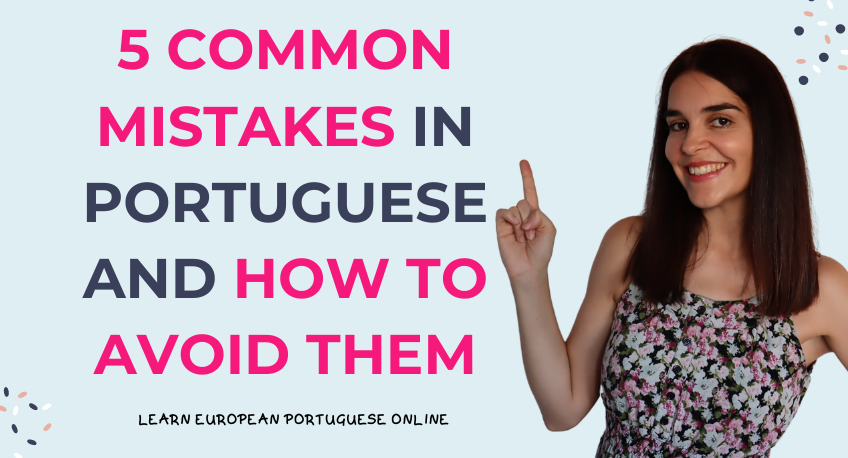Today I will be speaking about 5 common mistakes in Portuguese and I will try to give you tips on how to avoid them.
From my experience, learners of a second language tend to go through the same problems and this leads to a pattern in the kind of errors I come across while teaching the language.
In this post I will speak about 5 of those most common mistakes and in further posts I will continue to explore other errors, so stay tuned!
Ok, so with no further ado, let’s take a look at them!
You can also learn about this topic on my YouTube channel:
1 – Ser vs Estar
The first most common mistake I see people making is by mixing up the verb “ser” with “estar”. This happens especially to people whose first language does not have two kinds of “to be”.
As you might already know, in Portuguese we have these two verbs – ser and estar – as a translation to the verb “to be” in English.
However, the difference lies in the fact that “ser” is used when we are talking about more permanent states. For example, to talk about our height, type of body, nationality, etc – thus, things that are more unlikely to change in our lives – we use the verb “ser”. Think about it, if I am tall, it is kind of unlikely that I will stop being tall and therefore we say something like “Eu sou alta”, using the verb “ser”.
On the other hand, if we are talking about states that are likely to suffer changes, we use the verb “estar”. If I want to say something about the way I feel right now, how the weather is today, or other things that will probably change in no time, I will use this form of the verb to be. If the day is sunny, for example, I will say “Hoje está sol”.
Sometimes it may be tricky to fully understand these differences. There are some things you can argue do not make much sense in this theory of permanent vs temporary. Things like our profession or marital status are talked about using the permanent “ser”.
This can be confusing, as you may argue that these things are likely to change, especially in today’s society. However, you have to understand that Portuguese was not “invented” in today’s society. That is the key. In previous times, if someone was married, they would stay married forever (unless they were Henry VIII in England and had the power to change the laws of Church to get a divorce).
If you studied to be a teacher, for example, it would also be highly unlikely that you would change jobs ever again. You would stay a teacher forever and ever. For me, this may be one of the explanations to why we use the permanent verb here. Remember too, that “permanent” does not mean “forever” in the use of these verbs – it just means “for a longer time” than “temporary”.
To avoid making this mistake again, just read a lot about it, about the special cases and so on and practice as much as you can!
I also created a video about this topic. Check it out here:
2 – Word order of questions in Portuguese
In European Portuguese, questioning things as simple as “How are you” can be tricky. Why? Because of the word order in Wh-questions.
First a little backup of what wh-questions are: they are those questions that start with words like “how”, “when”, “where”, etc. These normally have “wh” in them, hence the name.
In Portuguese, these include words like “Quem”, “Quando”, and also “Como”, among others.
Now, students come to me very confused as how to ask things. This is so, as we have many different ways of asking the same question. Let’s take a look at the following:
- Como estás?
- Como é que estás?
- Como é que tu estás?
- Como estás tu?
All of the above are correct.
How is that possible, you may ask.
Well, in Portuguese we can either use the personal pronoun – Eu, tu, ele, etc – or hide it. Therefore, you can say “Como estás” vs “Como estás tu? or “Como é que estás?” vs “Como é que tu estás?”. Then, if we want to keep the normal word order – Subject, Verb, Object – we have to use the little particle “é que”, so that we do not have to do an inversion – Verb, Subject, Object. Therefore, we end up with sentences like “Como é que estás?” or “Como é que tu estás?”.
However, if we opt to leave the “é que” out, we have to change the word order and we have to say “Como estás tu?” instead. As you can see in this sentence we have first the verb – “estás” – and only then the subject – “tu”.
When you decide to leave the subject hidden, you may use the particle “é que” or not. That is why you may end up with sentences like “Como estás?” or others like “Como é que estás?”. I advise my students to try and use “é que” as much as they can, because this way it is less likely that sentences like “Como tu estás?” – which is wrong in European Portuguese (although correct in Brazilian Portuguese) – happen.
I hope this is not too confusing for you to understand. If it is, you can always leave a comment below or contact me for more explanations. You can also take a look at my article about the differences between Brazilian Portuguese vs European Portuguese. In there I also explain the differences in questions between these two language variations.

3 – Pronunciation of the vowels a, e, o
Oh, pronunciation! This is one of the most difficult things to tackle in European Portuguese and, unfortunately, one of the most common mistakes that my students make is to mispronounce the vowels a, e and o.
What normally happens is that people tend to think that they should be pronounced as open vowels, which is what happens in languages like Spanish or Italian and even in Brazilian Portuguese. In the European variation, however, these vowels can be pronounced in four different ways, and just seldom are they pronounced with the open pronunciation.
If we take a look at the “e” vowel, for example, you might have already noticed that this is hardly heard in many of the Portuguese words, especially if placed at the end. Words like “competente”, will sound something like “Komptent”. The same goes to “a” and “o”, this last vowel even sounding like “u/oo” in many occasions. Have you heard us saying “Obrigado“? Don’t we sound like “brigad”? Does this ring a bell?
I will not explain all the different nuances of these vowels in this post, but I urge you to go and take a look at my previous article about pronunciation. There, you can find all about stress and pronunciation in words.
If you want to sound like a native speaker and master the European Portuguese pronunciation make sure to check out the following video about my Speech Course:
4 – Conhecer vs Encontrar
If you have difficulties to understand the differences between these two verbs, you are not alone. I will try to explain it simply and hopefully you will no longer struggle.
“Conhecer” can mean:
- to meet someone for the first time – “I first met him when I was in the park” – “Eu conheci-o quando estava no parque”.
- to know something about which someone is talking about – “Ah, yes. I know that restaurant” – “Ah, sim. Eu conheço esse restaurante.”
- to know a place to which you have been before – “I know Japan” – “Eu conheço o Japão.”
“Encontrar” can mean:
- to meet someone that you knew before – “I met him again yesterday in the park” – “Eu encontrei-o outra vez ontem no parque.”
- to find something – ” I found a coin on the floor” – “Eu encontrei uma moeda no chão”.
Try to follow these simple guidelines and you should find the right path!

5 – Poder vs Conseguir
In the same way, students find it difficult to know the difference between “poder” and “conseguir”. Take a look at the following:
“Poder” can mean:
- to be allowed to do something – “I can go out until 1am” – “Eu posso sair até à 1am.”
- to have the possibility – “I can look after your dog” – “Eu posso olhar pelo seu cão”.
“Conseguir” can mean:
- to have the capacity to do something – “I can jump really high” – “Eu consigo saltar muito alto”.
Both “poder” and “conseguir” are sometimes used interchangeably, but in general they take on those roles I described above. Someone has proposed that “poder” is something like “can” and “conseguir” is something like “to manage”. I think that might be a good way to think about it. Take a look:
- Pode chegar-me a água? – “Can you pass me the water?”
- Consegue chegar-me a água? – “Do you manage to pass me the water?” (I might ask this if the water is in a high place, for example, and I am not sure if the person is tall enough to reach it).
What do you think? Does it make more sense this way?

Well done! You have made it to the end. Did you like it? Are these some of the most common mistakes you make? Do you have others you would like to see explained?
Just let me know in the comment section below and I might include them in future posts.
Last but not least, make sure to check out my European Portuguese Online Course where I speak about this and many other topics in more detail.
Thank you for reading and hopefully see you around!
Beijinhos,
Mia


Muito obrigada Mia. You are the best!
Beijinhos
Sabina
Olá Sabina,
De nada! Thanks a lot for the feedback =)
Beijinhos
Mia
very clear, thanks!
Hi Elena,
thank you very much!
Beijinhos
Mia
These articles help a lot, thanks
Hi Sharon!
Thank you, I’m glad 🙂
Beijinhos,
Mia